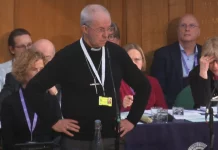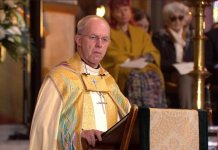The Church of England’s own committee urging it to set aside a billion pounds to atone for slavery is an almost perfect summary of what is wrong with modern Britain. It’s all here, in this one report: historical illiteracy, bureaucratic carelessness with other people’s money, national self-loathing, importation of American culture wars, lack of interest in outcomes.
Let’s start with the most basic objection. If you want to rank the heroes and villains of the slave trade, then in my view the Church of England stands (alongside Quakers and Methodists) close to the top of the heroes’ table.
William Wilberforce, who pushed through the legislation to extirpate the foul business, was moved by his Anglican faith. So was John Newton, the former slave trader who repented, composed Amazing Grace and ended his days as a Church of England curate.
Thanks to them, and to hundreds of thousands of ordinary churchgoers who lent support to their campaigns, Britain not only abolished slavery in the parts of the world it controlled, but poured its blood and treasure into a long, gruelling and ultimately successful war against the slave trade everywhere else.
But, of course, that story would never do. It smacks too much of patriotism and of white saviour complex. So the Church Commissioners set out to find evidence of guilt. It turns out that, in the early 18th century, some of the church’s finances were invested in the South Sea Company, which shipped 34,000 enslaved people across the Atlantic.
Does that mean that the Church of England was pro-slavery? Obviously not. Many ministers were constantly sermonising and agitating for abolition, and its bishops voted for and against the abolition of the slave trade in the House of Lords.
Does it mean, then, that the Church was hypocritical, or at least careless? Not necessarily. Can you say for sure whether your pension fund invests in, say, Volkswagen, which cheated on its engine emissions tests and which maintains a highly controversial plant in Xinjiang?
So what, you might say. Whether its servants were heartless or simply thoughtless, the Church still profited from human misery. Does that not create a debt?
Well, if it did, the debt has been settled many times over. It was settled by the young men, motivated by religious conviction, who gave their lives to hunting down slave ships after 1807. It was settled by the Anglican missionaries who penetrated the African interior, often dying of tropical diseases, seeking to persuade local potentates to free their chattels.
It was settled, not least, by British taxpayers, who gladly approved the spending of 1.8 per cent of GDP annually between 1808 and 1867 on global eradication; arguably the most expensive moral foreign policy in human history.
That was meaningful restitution. Britain had been a player in the slave trade in the 17th and 18th centuries. When, like John Newton, it saw that it had been wrong, it sought to make good that wrong by liberating as many remaining slaves as it could, diverting ships to hunt down the Guineamen even at the height of its life-and-death struggle with Napoleon.
The Church Commissioners, by contrast, want to make a symbolic rather than a practical repentance through gestures like “investments into Black-led businesses”.
Never mind whether the leaders of those businesses are descended from slaves or slave-owners, for this does not seem to be about compensation. It appears instead to be about fashion – specifically the fashion for racialising every question, a fashion we have imported from the United States.
“African chattel enslavement was central to the growth of the British economy of the 18th and 19th centuries,” declares the report. Despite repeated efforts to prove this claim, however, it remains thoroughly dubious. It still seems more likely that the growth of the British economy was driven by independent courts and secure intellectual property rights. These things enabled the Industrial Revolution and thus, ultimately, rendered slavery economically obsolete as well as morally repugnant.
The cost of eradicating slavery was quite likely greater than any previous national profit, making talk of reparations nonsense. And we know, in any case, that no settlement would be treated as final. There would always be new demands, for we are dealing with a state of mind, not a legal claim.
Hence the arbitrary figure of a billion pounds. We are in a world of gestures, of virtue-signalling, of ostentatious religiosity. “The Pharisee stood and prayed thus with himself, ‘God, I thank thee, that I am not as other men are, extortioners, unjust, adulterers, or even as this publican’.”
A billion pounds is roughly equivalent to the sum raised annually by all the Church of England’s parishes. The churchgoers who stump up that cash could hardly be less like the virtue-signalling Pharisee. If anything, they more closely resemble the penurious widow recalled in Mark’s Gospel who “threw in two mites”.
Read it all in the Telegraph










